Ray Waters
For vintage photos and missions list please see our searchable database.
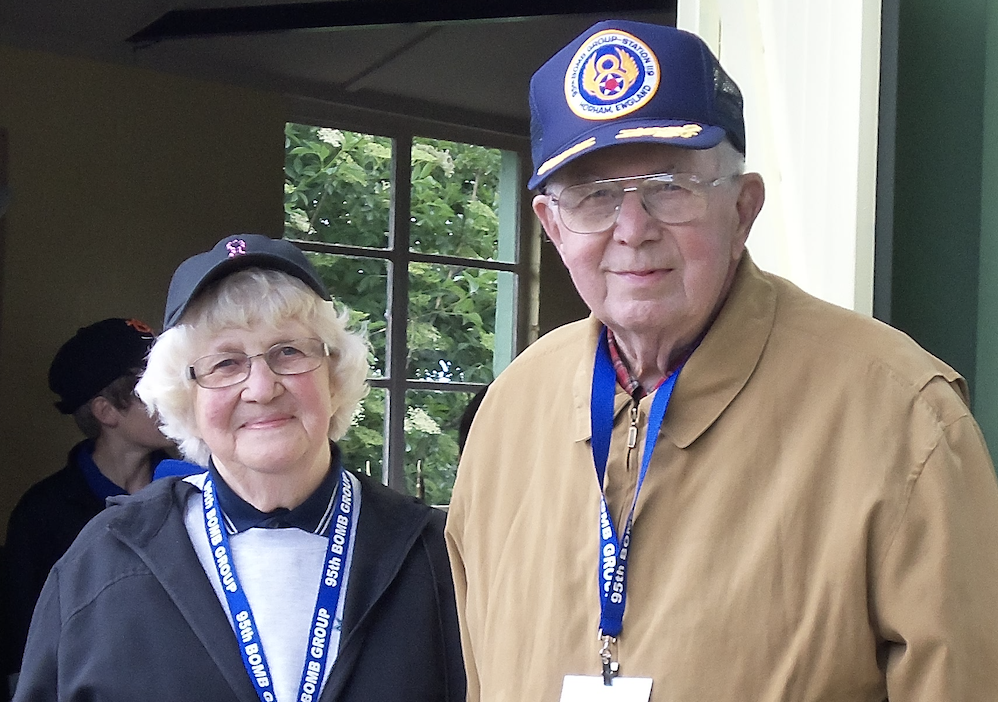
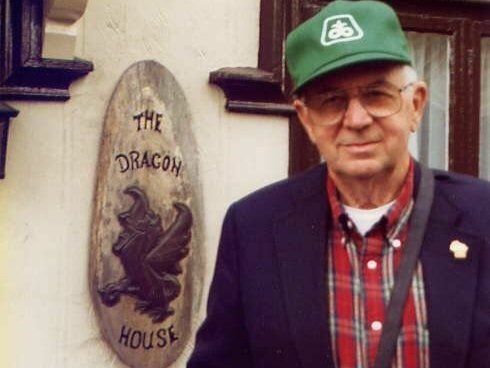
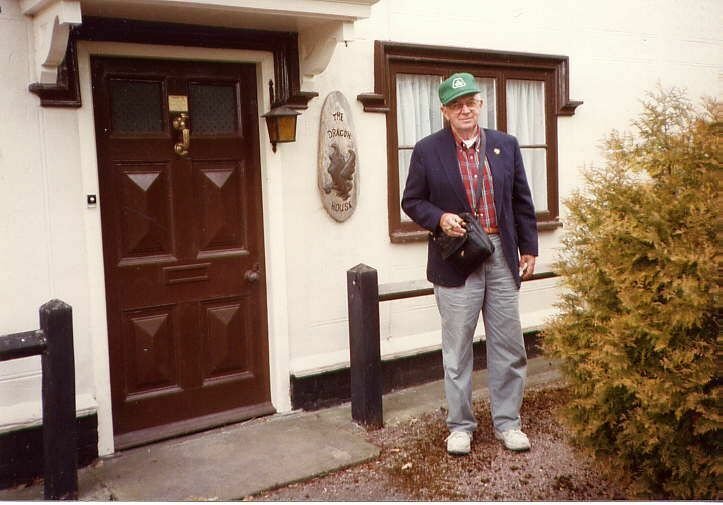
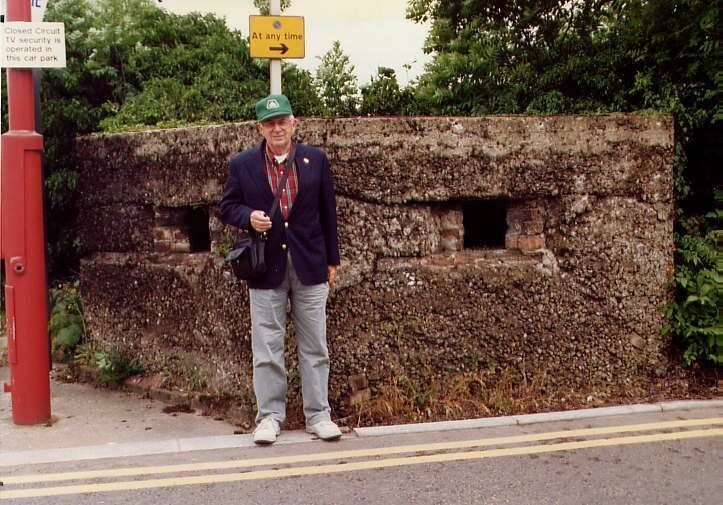
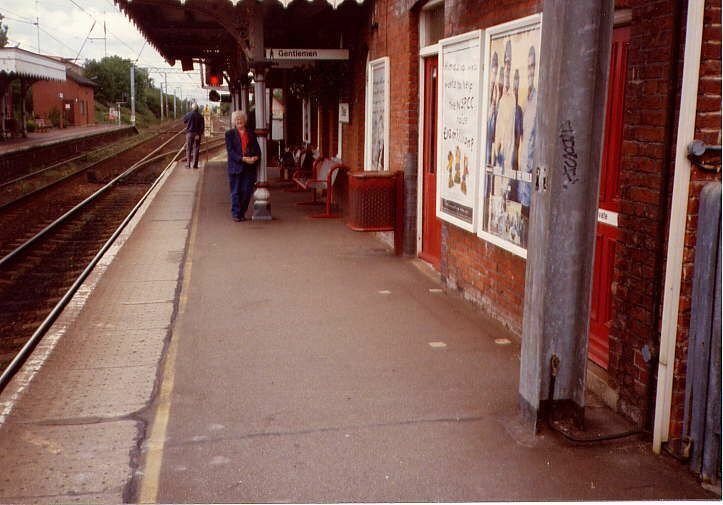
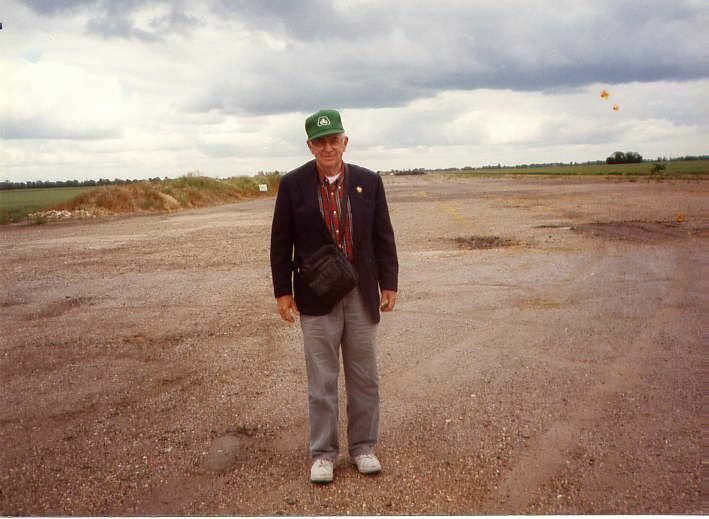
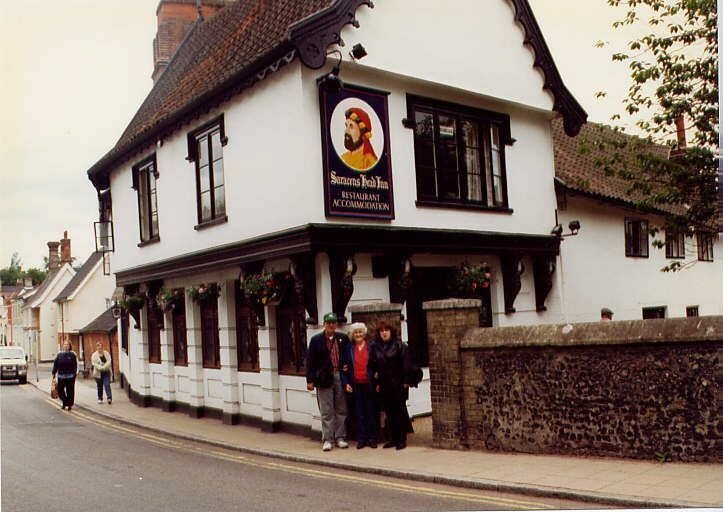
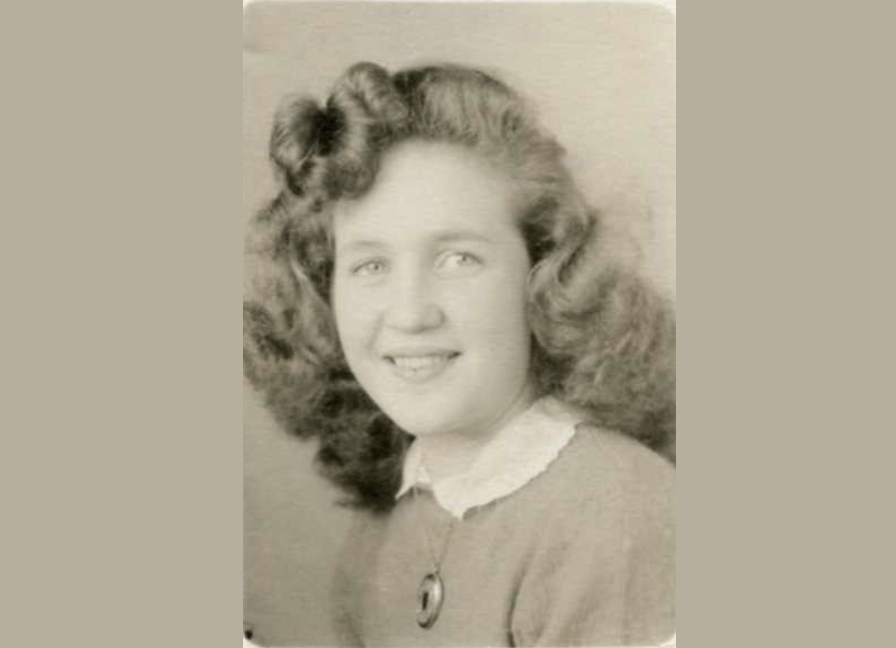
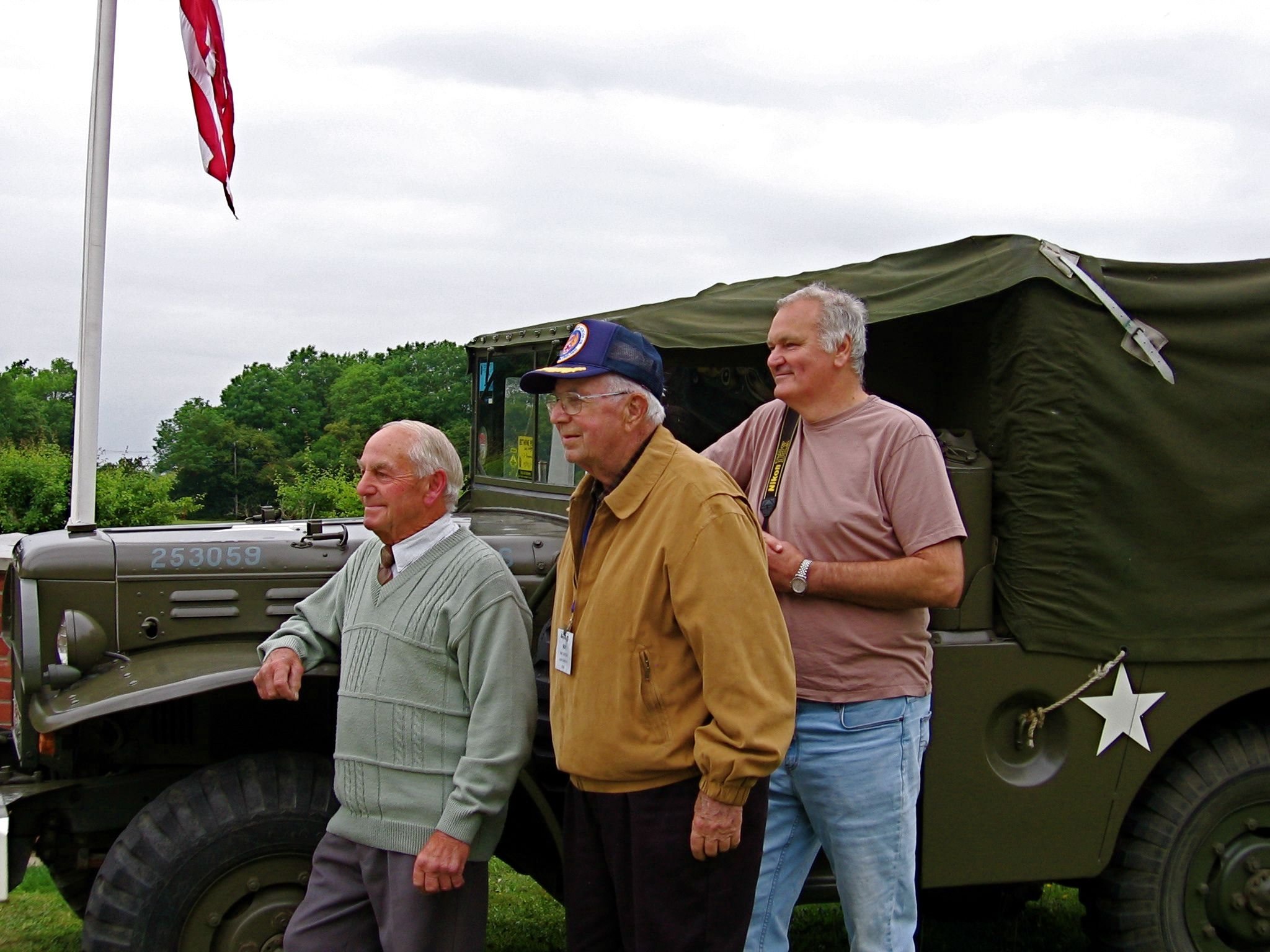
95th BOMB GROUP (H)
ORAL HISTORY PROJECT
2007 REUNION SAVANNAH, GEORGIA
(Interviewed by Tom and Peggy Cozens)
RW: My name is Ray Waters. Today’s date is May 23rd, 2007, Savannah, Georgia. Years of service, two years. Unit served is the 95th Bomb Group, stationed at Horham, England. My career field was tail gunner.
TC: So just……
RW: Anything else I got. Okay. Well I just wrote up a few things while I was upstairs. Okay, prior to my enlistment in the service I worked for Consolidated Aircraft building B-24’s. I worked there for two years. I did not take any deferments, which I could have taken. But I eventually thought I’d like to fly one. Entered service October ’43. Discharged in October ’45. Wrote an exam to become an Air Force pilot. Passed the Air Force pilot exam. And at that time they weren’t looking for any pilots, and I just ended up in an air crew training. I took my air crew training at Laredo, Texas, which you got there. And also gunnery school was at Laredo, Texas. Then we were sent to McDill Air Force base in Tampa, Florida for air crew training and assignments to our crews. I trained as a tail gunner, and became a member of the William Shaw crew. And we trained together until about August of 1943 when we went to Savannah, Georgia to pick up a brand new B-17 to fly to England. We landed in Valley, Wales in September of 1943, and then to the 95th Bomb Group in Horham for further assignment. After some training and several flights at Horham, we were assigned to the 335th squadron. We flew our first mission early in October (October 6, 1944). I don’t have the dates right here now. But our first mission was to Berlin, which was a scary start. And the second mission to Breman. The 13th mission, we also were assigned Berlin. And then the 35th mission we were assigned Berlin. Three of the scariest ones you fly. We had a very successful tour, really. We only had one person that was seriously wounded by flak – that was our waist gunner, Belinski. We lost engines several times, falling out of formation. We had a good navigator that steered us away from flak gun in placements. We force landed once or twice. We used our electric suits to keep warm, and we run the battery dry, the battery dead on an airplane, so we ended up cranking it by hand the next morning. We learned a good lesson there. You can crank them by hand, you know, yeah. Here’s a list of my crew: William Shaw – do you want the members of my crew?
TC: Yeah, that’s great.
RW: My pilot was William Shaw. My co-pilot was (Allen) Kleban – K-l-e-b-a-n. My navigator was Jack Ben Rube. My bombardier was Lyle Williams. Top turret gunner was Joe Wojtowicz. Radio operator was Dick Galloway. Ball turret was Paul Waters. He was a Waters also. And my waist gunner was (Alexander) Belinski. (Second ball turret gunner was Howard Alexander). And the tail gunner was myself, Waters. I celebrated my 21st birthday in London on November 23rd, 1944. I took a taxi tour of London. As far as my medals went, I ended up as a staff sergeant. I had the Air Medal with 5 oak leaf clusters, 3 presidential citations. Returned to the United States in April of ’45 and went to Amarillo, Texas. And I went to a gunnery school for B-36’s. And I became, after going to the school, I became an instructor for B-36’s. At the end in October when the point system was given out, I had 85 points already, so I was discharged in October of 1945. That’s my career.
TC: On the flight over to England, can you tell us what that was like and what stops you made on the way?
RW: We made two stops, I think. One was with the Eskimos up there (in Goose Bay, Labrador). The one that was a little scary was at Reykjavik, Iceland. They were kind of pro-German and we had to leave a guard on the plane overnight there. And then two or three of us that didn’t know any better said, “we’ve got to go to town.” So we had to go to town. We went to a theatre and probably could have got shot right there, you know. But that’s when you’re young and foolish. Anyway, then we went – we did get some scary readings. Our radio operator was trying to get locations and information about our headings and all that as we flew over. We got some fictitious headings and stuff, so we were being – they tried to turn us around. Anyway, we overcame that okay, so no problem there. No, there were no big incidents, really. Just an experience.
TC: How about on your return trip, when you were done with your duties in Horham. Did you fly back, or did you go by boat?
RW: We came back by boat. We took about two days, or something, or four days. It was quite a while on the boat. We landed in Boston. We got over there a lot faster than we got back. (chuckle) Anyway, it was no problem.
TC: The first mission was to Berlin. Do you remember how many other planes, what it was like on the flight, the resistance?
RW: No, I think before that mission was over, I think we lost a couple of engines before we got there. I don’t know if we’d done much of anything besides get there and get back. We didn’t – I did have some information one time, a little bit more about that, just what we did do. Whether we actually made the whole run or not, I don’t remember. (We did get credit for the mission. The first. October 6, 1944). Sometimes after you lose an engine or two, you don’t – you fall out – you don’t make it. That was where we were sent, I remember. I don’t remember the full details on it. I think the other two we probably made them okay, but that was our first mission. We were a little green, too, I think. We might have fallen out. I’m not sure. We really made the whole tour of duty.
TC: What was your, what would say was your worst day in training?
RW: Worst day in training. Oh, I don’t know. I didn’t have too many bad days in training I don’t think. I’ll give you this as an example. We were down there and they were waiting to assign us to crews in Tampa. And they had a big banana boat in there that they wanted to get unloaded. We had a bunch of us setting around. We didn’t have anything to do. He says, “We’ll take that group of guys out of …” We were setting in Drew Field, waiting for assignments and that. We went down for a couple of days and worked at unloading banana boats (laughter) just to keep us off the streets, I guess. No, I didn’t have any bad experiences. We always used to say “There was a crash a day in Tampa Bay.” They had a lot of old war weary planes that were flying, you know. And there was something happening to them all the time. One thing I really enjoyed in training, though, was our pilot liked to shoot my guns. So we’d have someone pulling the sleeves along, like they do, you shoot at the sleeves. He’d call me up and say, “You come on up here. I want to take a crack at those targets.” He said, “You set in my seat.” So I got up there and I was – it really tickled me to sit in the pilot’s chair and make a couple of tours around and back and forth. And we’d waste some of my ammunition. So that some of the better part of my training. Yeah, yeah. That I enjoyed.
TC: What was your, what were the accommodations like for you in Horham?
RW: Oh, they were fine. We didn’t have enough coke to keep warm hardly. They give us one or two sacks for a week and you had to make that last. We made one big mistake, though. There were some nice big old trees out there, and two or three of the guys in the barracks said, “We’ll go get some wood and we’ll get some heat in that stove.” We just had a little bitty dinky pot-bellied stove. We went out and cut down a tree. Holy – we got in bad trouble. Guys with the little derby hats came around, as if that’s the king’s trees you’re cutting down there, you know. Boy, we had to do a little begging then to – really sorry we did. We did cut a tree down, which wasn’t the thing to do. Headed for the bomb shelter – we did see a few buzz bombs over us all the time. And they’d send us to the air raid shelters on those. The spitfires were pretty good about overtaking them and shooting them down before they got to London. Yep
TC: And you had your 21st birthday in London. Tell us more about that, where you went?
RW: Just to the Rainbow Club, yeah big Rainbow (Red Cross) Club there. I guess I probably told somebody it was my birthday, and I think they treated me a little extra special that day. Then I decided it would really be a good day to see what I could see of London. We went to St. Paul’s cathedral. We went to all the – Dicken’s Book Shop. We went to everything you hear about in London. I spend all day with this taxi driver. Made a good day of it. That was time well spent.
TC: Did you take the train then?
RW: Yep, from Diss to London.
TC: Did you get to know any of the local people around Horham?
RW: Not really, no. We always had, kids were always hanging around there, you know. No, I never did really get into the local people. Of course I wasn’t there that long, really, either. I wasn’t there (six) months, no more than that probably. So you’re not there that long. Someone like your Dad was there for a long time. But us people flew our missions and took off again, you know. So I didn’t get too well acquainted, no.
TC: What was your worst day, duty wise, once you were in England?
RW: I suppose we were shot up the worst the day we our waist gunner got hit. I think we counted over 200 flak holes in our plane. Like I said earlier, I think my tour of duty was rather uneventful in a way, because everything really went good. We had a good crew, and our pilot was great. I used to set in the tail and watch. Flak would start tracking us, if you ever know what I’m talking about. The flak guns, on a clear day they could see you. They’d start tracking you. The puffs would keep coming closer and a little bit closer, and a little closer. I’d call the pilot and he’d say, “If you see them start getting on our tail, say something. I’ll move it up or move it over or do something. And we done that a lot. I’d say, “They’re on us.” And he’d move it up, move it over. You can’t move too much in a tight formation, you know. But he could move her a little ways. Rather than have them track right on us. I did have German fighter planes fly within pretty near reaching distance of us. They come down through our (formation) – they’d get up there and they’d come down through our formation, you know, like that. We flew such tight formation, that you didn’t hardly shoot him or I’d shoot our own planes sometimes, you know. We had no really terrible bad things happen to us. I guess I wouldn’t be here if I did (Laughing). It went good.
PC: What did you guys do, like what was your longest mission. And what did you do to pass the time? I mean, did you guys talk a lot to each other, tell stories?
RW: Oh, yeah. Rode our bicycles to the pubs (chuckle). We had a – the barracks got to be a pretty good bunch of guys in these barracks. They played cards. The visited – wrote letters. It always seemed they had something to do. All good friends. You get pretty close. Everybody gets pretty close, you know, at a time like that. There wasn’t too much differences between us and our officers even. We were over to their place, they were over to our place. We were mixing up. It wasn’t too much saluting. It wasn’t that military. Pretty much of a one team outfit. It was a good bunch of people.
TC: I know it took a long time to get up to altitude, climb to altitude, and then your formation. I’m sure there was some distance of flying before you got to the point where you had to worry about the fighters and the flak. During that time, what did you guys do to entertain yourselves?
RW: Well, it was my job to flash an auto sign lamp. I had a lamp autoson, and I’d flash B - dit dot dit dit or whatever B is – dit dit dot or dot dit dit – something like that. So we could group together and keep the units together because there’d be so many bombers trying to find their own location. Why there wasn’t more accidents, I’ll never know, with a thousand bombers in the air trying to find a squadron. Anyway, I did that – I flashed this auto sign lamp all the time – a B. I sat and went back in the tail. I didn’t mind sitting in the tail, so I’d go back there and stay there most of the time. I got used to it.
TC: With your crew, did you actually have knick names for each other?
RW: Oh, somewhat. Not a lot that I can remember – no. No, Dick and Paul. I can’t say there was much for knick names, really.
TC: Can you tell us, I know you gave us their names, which is great that you remember them. We may have some family members of your crew who will want to listen to this tape or read the transcript. Is there anything you can think of, any anecdotes about each crew members, or any of the crew members? What they were like to be with?
RW: Well, one thing that kind of stands out in my mind. I was a northerner, you know, Wisconsin. And I had some southerners from the Carolinas. And whenever we went to town and you’d see a black guy walking with a white girl, he’d say “If that was in our hometown he’d find him in the ditch the next day.” There were no ifs and ands about it, you know. At that time, there wasn’t much love for the, southerners didn’t have for the negro at that time. So that was something I learned, being a northerner, that there was that much hatred there, you know, between those guys. They were, like our radio operator, was truly a southern guy, and he was definite who he associated with. And the thing he could do was pitch horseshoes, the radio operator. He’d go out there to these horseshoe pits when we had a little time to throw horseshoes. He’d act like he couldn’t throw. The thing would hit the ground and roll. And pretty soon somebody would come along and say, “I’ll play you a game for a dollar.” Okay, then he’d start throwing. Pretty soon he’d get up to $10 or $20. Then he could really throw. I said, “Where did you learn to throw horseshoes like that?” He said, “From the negroes. From the niggers” He called negroes niggers. “From the niggers.” They taught him how to pitch horseshoes like that. Oh, he was a good.
PC: He was a sandbagger.
RW: He was a sandbagger. Yep. But he got all his training from the guys he didn’t like. (Laughing) Pretty interesting too.
TC: What was the food like?
RW: Good. The mess sergeant was up by the table, and pay day and collect I don’t remember how many pounds he took – 3 or 4 pounds – out of each one of our paychecks if we wanted fresh eggs for mission days. So, we were glad to do that. He’d go out around to the local neighbors I guess and buy chicken eggs, fresh eggs. A lot better than the powder ones. I never did complain about the food. I was happy with it. Some would, but I didn’t. Yeah.
TC: You did two other missions to Berlin - I think the 13th and the 35th. Anything in particular about either of those?
RW: Nothing ever stood out like they were… except they were probably not as worse as any other mission we flew. Just the thought of, we’re going to Berlin. Now you’re really going to be in trouble there, you know. No I don’t think we ever had anything exceptional bad happen by going to Berlin.
TC: Was there any one mission where you thought, not sure if I’m coming home?
RW: Well, we had a couple of missions to these oil refineries where they really put up, they put up everything they had to protect their oil. Of course that’s what finally brought them down – Regensburg and a few names like that. If you were assigned that mission you’re lucky to make it sometimes, you thought. I had the oxygen meter blown off the wall beside me . I had to go on a tank a couple of times. When your little blinker gets blown away, you got to go on a tank, you know. Lose the whole ship’s oxygen. No, we were just pretty thankful. We had a …. It was no fun, but it was not like some had. We had a pretty good tour. I had one of my friends that was in the 95th that ended up walking – shot down over the ball bearing factory – heck, I can’t remember. Anyway, the French Underground picked him up and he walked back through that. He was a guy from my home town.
TC: So he was able to evade successfully.
RW: Yeah. He made it back. Then I had another good friend from our small hometown that went in a B-24 group. And they went to Polesti, and they done one of those raids where they went the tree top levels of Polesti, and he didn’t make that either. One of my better high school friends got in about a little before I did. But he got be a P-51 pilot. He give me a call one day, and he was over there at the same time. So I’ll meet you in London. And he never made that either. He got shot down too. He was a 51 pilot. We got to have a few heartaches there. Didn’t get to meet him in London.
TC: You said before you enlisted, you were building B-24’s. Can you tell us a little bit about that?
RW: Oh, I was right out of high school, you know. ’41, I just graduated high school in ’41. I was only 17 when going to San Diego. I couldn’t get a job until I was 18 – child labor law out there, you know. They were looking. They needed help. So I worked on a crew that cleaned up inspection sheets. And inspectors would go through them and pick up something that wasn’t right. A water cooler wasn’t in here. There was something else that wasn’t right. Had these deicer boots on the front of the wings that they were leaking. Have to go through and repair that stuff. I was kind of a repair guy. So I done a lot of different jobs when I was working there. Cleaning up things that the inspectors found wrong.
TC: And that was in San Diego?
RW: San Diego. I was there two years before I went in the service. All my buddies were going in the service, and here I was setting there. I was being deferred a lot out there. I got to get out of here. Feel pretty worthless with them… I had one of my friends come out there, join the Marines, you know. That’s a pretty tough school out there at the marine base in San Diego. Gee, if he can do that, I can get out of here. (Chuckle)
TC: I watched with my Dad. I took him to see ‘Saving Private Ryan.’ And he didn’t know how those guys did it. And of course, they’re going, if you talk to them, “I don’t know how you guys could be up there with all the flak and the fighters.”
RW: By the time I was in the main part of my tour, our P-51 pilots, or planes, could have their extra wing tanks, and so forth. And they went the whole mission with us. Soon as a few Messerschmitt’s would show up around there, then they’d start dropping their wing tanks. And they’d really put it to them, you know. So we didn’t get as much fighter problems. We got an awful lot of flak trouble. We sure did – our escorts were really good. They could go all the way to target and back. When they start dropping wing tanks, you know we better start watching them. Something would happen. Of course they tend to lose their gas. And of course they couldn’t stay too long then after that. But they were good escorts. Some of the first crews didn’t have that good a time about it. Fighters couldn’t stay with them too long. They would get into Germany a ways, and they’d leave. We had the good escort.
TC: What was the funniest thing that happened to you? Or the most unusual?
RW: Well, I suppose there were a lot of things when you get a crew of guys like that.
TC: Any pranksters in the crew?
RW: Well, you know, this one. Maybe I shouldn’t tell the story on him, but it’s true. This other guy by the name of Paul Waters, he and I always got to bunk together. Names came up together, everything came together. After we flew a few missions, he decided “I’m not going to go down in that ball turret.” They put him in the ball turret. He’d take a few flak suits and lay around the top up there in the waist. The pilot would call back and say, get to a target, and he’d say “Are the bomb bay doors open?” He’d wait a minute and say, “Yep, bomb bay doors are open.” Because the ball turret’s suppose to check that underneath there, you know. And he’d say “Any other planes right underneath us?” Because someone had to watch out there wasn’t somebody flying right under, you know. He’d wait a minute. “Yeah, everything’s clear.” Pretty soon the waist gunner, he couldn’t keep it up any longer. He says, “He’s not in the ball turret.” So that was the end of his career. They kicked him off the crew then. (Laughing) He was just too scared. He went down there once or twice and he got scared out. “I’m not going down there anymore.” So then we had to get a new ball turret. That’s not funny. It’s just a …
The funny part is that he keep answering that everything was clear underneath. Drop the bombs anytime. Everything’s clear under here. He wasn’t even there.
TC: One of the guys here told the story that his pilot liked to sit, try every position in the plane.
RW: Yeah, yeah.
TC: And he went in the ball turret, down once, and he came back up and he said never, never ever again.
RW: I heard that story too (chuckling) Stowed the guns, and that’s it.
TC: Yeah, yeah. I’m sure there’s a lot us that would not have been able to handle that ball turret.
RW: I don’t know if you’ve interviewed this Mac Makarewicz. He was quite a tall young guy, and he said when they decided who’s going to do what job in the plane, he said, I was walking through the waist, the ball turret, and he just pointed to me and said “Down.” I’m tall, he said, I didn’t think they would pick me for a ball turret. He said, “I didn’t say nothing. I went down.” (Laughing) Just the way he told the story about how he went down in the ball turret. He stuck it out.
TC: Good for him.
RW: He said, “I’m suppose to go down, I’ll go down.” And he did. It’s not the kind of a place you want to stay. But those that did do it and stuck with it, they got through it about as well as anybody else, I guess.
TC: Was there ever a time that, to keep the plane flying, you had to jettison equipment.
RW: Yeah, we did throw out – we lost a couple of engines one time. We were over Holland. We had to start ditching stuff to keep some altitude. We threw out a lot of the loose stuff we could get a hold of. Like I was telling you before one time, our navigator was really sharp, you know. He could steer us this way and that way, and keep us out of the gunning placements. Yeah, we threw off some stuff over Holland one time. It wasn’t a really big deal. I think we still had two engines. We went down to where we could still hold a little altitude. But you can’t stay with the formation. You’re just going to keep dropping out – they’ll go off and leave you, you know.
TC: Any landings in particular that stick out?
RW: Oh, there’s one landing where we had to crank the engines the next day. That was a forced landing. We couldn’t find our field – fog or whatever it was. So we landed – got across the coast and landed the first place we could get in. That was probably the only forced landing. We ended up hand cranking the engines to get it going again.
TC: Let me ask you – I’m running out of questions (Laughter). Is there anything in particular you’d like to – like if your great great grandson or granddaughter listens to this on down the road, anything in particular you’d like to say to them about your experiences?
RW: I don’t know. I really can’t think of anything that would be good advice to them as far as – I guess if you get a job like that, the thing to do is to do it. That’s it. Not much other advice I could give them. That’s your job. Do it. Yep.
TC: That’s good advice. That says a lot about your generation.
RW: Oh yeah. It was a good generation. You bet. They were great.
PC: I’m sure proud of you guys.
RW: I’m glad that everything turned out as good as it did. And I’m sure – no regrets I don’t think from anybody that did it. They did it for a reason. No regrets that I know of. I think I thought in the back of my mind one time, but things were a little bit going rough, I said, “Why didn’t I stay in that aircraft factory when I could have.” (Laughing) I say, “No, I couldn’t do that.”
PC: That was when you were really cold. (Laughing)
RW: I could have been in San Diego in the aircraft factory, yeah. But that was just a passing thought.
PC: Well thank you so darn much for doing this, for future generations.
